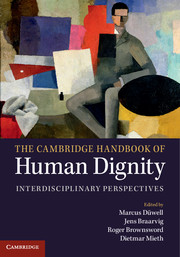Book contents
- Frontmatter
- Contents
- List of contributors
- Foreword
- Why a handbook on human dignity?
- Acknowledgments
- 1 Human dignity from a legal perspective
- 2 Human dignity: concepts, discussions, philosophical perspectives
- Part I Origins of the concept in European history
- Part II Beyond the scope of the European tradition
- Part III Systematic conceptualization
- Part IV Legal implementation
- Part V Conflicts and violence
- Part VI Contexts of justice
- Part VII Biology and bioethics
- Appendix 1 Further reading
- Appendix 2 Universal Declaration of Human Rights
- Index
- References
2 - Human dignity: concepts, discussions, philosophical perspectives
Published online by Cambridge University Press: 05 March 2015
- Frontmatter
- Contents
- List of contributors
- Foreword
- Why a handbook on human dignity?
- Acknowledgments
- 1 Human dignity from a legal perspective
- 2 Human dignity: concepts, discussions, philosophical perspectives
- Part I Origins of the concept in European history
- Part II Beyond the scope of the European tradition
- Part III Systematic conceptualization
- Part IV Legal implementation
- Part V Conflicts and violence
- Part VI Contexts of justice
- Part VII Biology and bioethics
- Appendix 1 Further reading
- Appendix 2 Universal Declaration of Human Rights
- Index
- References
Summary
The following introduction aims at an overview of relevant conceptual and philosophical distinctions and questions that discussions about human dignity are confronted with. I will mainly focus on questions about ‘human dignity’ that are relevant within the context of the human rights framework. First, I will explain why we are in need of a philosophical account of human dignity at all. Second, I will distinguish different ideal typical models of (human) dignity. Third, I will distinguish different conceptual questions related to different approaches to human dignity and their philosophical articulations. Fourth, I will investigate some relevant questions on the way towards an ethics of human dignity. Finally, I will propose some topics that I consider to be important questions for future philosophical debates about this concept.
Why develop a philosophical account of human dignity?
When in 1948 the Universal Declaration of Human Rights (UDHR) was signed, human dignity was introduced as a kind of moral reference point for an agreement that could provide normative guidance for the interpretation of the human rights framework in general. Most people believed that they knew what human dignity was about: a consensus within the humanistic tradition, a secularized version of the Judeo-Christian concept of Imago Dei, an overlap between the ethical doctrines of important thinkers like Kant and Confucius, the normative core of the natural law tradition, a moral–political statement against the atrocities of the Nazi regime etc. Although obviously not everyone endorsed the notion, it was generally assumed that its meaning and status were clear – and thus it appeared superfluous to strive for a theoretical explanation and justification of the concept.
- Type
- Chapter
- Information
- The Cambridge Handbook of Human DignityInterdisciplinary Perspectives, pp. 23 - 50Publisher: Cambridge University PressPrint publication year: 2014
References
- 22
- Cited by

